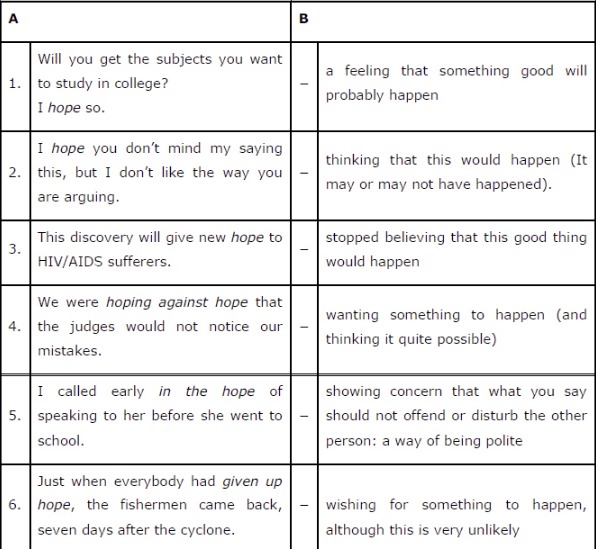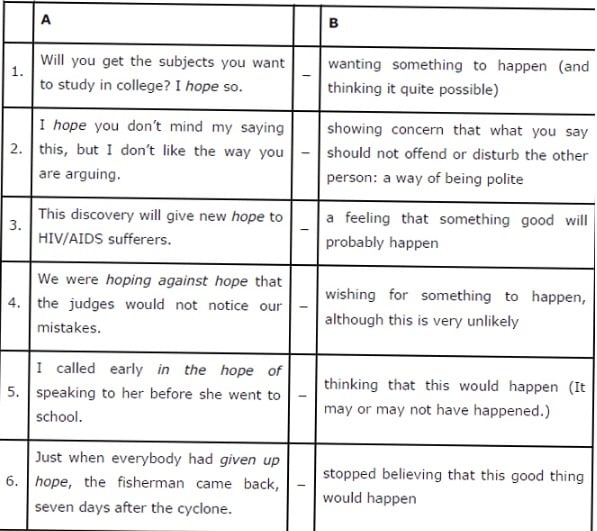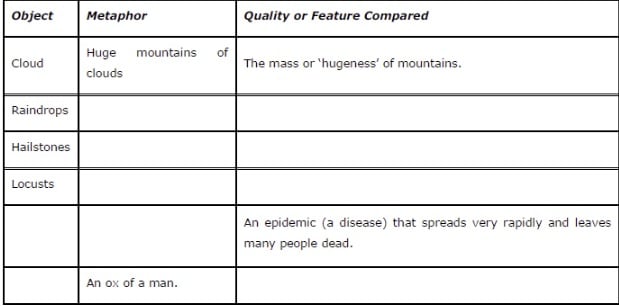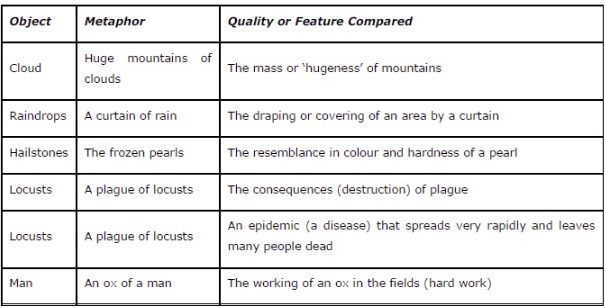A Letter To God
Oral Comprehension Check P.5
Q.1: What did Lencho hope for?
Ans : Lencho hoped for rains as the only thing that his field of ripe corn needed was a shower.
Q.2: Why did Lencho say the raindrops were like ‘new coins’?
Ans : Lencho’s crops were ready for harvest. However, they required a good downpour before harvesting. After a downpour, he could sell the harvest and get money. That is why he compared the raindrops to ‘new coins’.
Q.3: How did the rain change? What happened to Lencho’s fields?
Ans : The rain was pouring down. But suddenly, a strong wind began to blow and very large hailstones began to fall along with the rain. The hail rained on the valley for an hour, because of which Lencho’s fields were destroyed. There was not a single leaf left on the trees and the flowers were gone from the plants. The corn was completely destroyed.
Q.4: What were Lencho’s feelings when the hail stopped?
Ans : When the hail stopped, Lencho’s soul was filled with sadness. He looked around at his fields and said that even a plague of locusts would have left more than what was left after the hailstorm. He said that they would have no corn that year and they would go hungry. He was full of sorrow.
Q.1: Who or what did Lencho have faith in? What did he do?
Ans : Lencho had faith in God. He had been instructed that God’s eyes see everything, even what is deep in one’s conscience. Therefore, he wrote a letter to God expressing his need for a hundred pesos so that he could sow his field again and live until the crop grew again.
Q.2: Who read the letter?
Ans : When the postman saw that the letter was addressed to God, he laughed and took the letter to the postmaster, who then read it.
Q.3: What did the postmaster do then?
Ans : In order to keep the writer’s faith in God alive, the postmaster decided to answer the letter. When he read that Lencho needed hundred pesos, he asked for money from his employees. He himself gave a part of his salary. He could not gather the entire amount, but managed to send Lencho a little more than half the amount. He put the money in an envelope addressed to Lencho and signed it ‘God’.
Q.1: Was Lencho surprised to find a letter for him with money in it?
Ans : No. Lencho was not at all surprised to see the letter from God with money inside it. His confidence and faith in God was such that he had expected that reply from God.
Q.2: What made him angry?
Ans : He got angry when he counted the money. There were only seventy pesos in the envelope. He was confident that God could neither make a mistake nor deny him what he had requested. Therefore, he concluded that the post office employees must have taken the remaining thirty pesos.
Thinking about the Text P.7
Q.1: Who does Lencho have complete faith in? Which sentences in the story tell you this?
Ans : Lencho had complete faith in God. The sentences in the story that show this are as follows: (i) But in the hearts of all who lived in that solitary house in the middle of the valley, there was a single hope: help from God. (ii) All through the night, Lencho thought only of his one hope: the help of God, whose eyes, as he had been instructed, see everything, even what is deep in one’s conscience. (iii) “God,” he wrote, “if you don’t help me, my family and I will go hungry this year.” (iv) He wrote ‘To God’ on the envelope, put the letter inside and, still troubled, went to town. (v) God could not have made a mistake, nor could he have denied Lencho what he had requested. (vi) It said: “God: of the money that I asked for, only seventy pesos reached me. Send me the rest, since I need it very much.”
Q.2: Why does the postmaster send money to Lencho? Why does he sign the letter ‘God’?
Ans : The postmaster sent money to Lencho in order to keep Lencho’s faith in God alive. He turned serious when he read Lencho’s letter and wished he had the same faith in God. Even after he saw that Lencho had requested for money, he stuck to his resolution of answering the letter. He gathered as much money as he could and sent it to Lencho. He signed it ‘God’ so that Lencho’s faith would not get shaken.
Q.3: Did Lencho try to find out who had sent the money to him? Why/Why not?
Ans : No, Lencho does not try to find out who had sent the money to him. This is because he never suspected that it could be anybody else other than God who would send him the money. His faith in God was so strong that he believed that God had sent him the money.
Q.4: Who does Lencho think has taken the rest of the money? What is the irony in the situation? [Remember that the irony of a situation is an unexpected aspect of it. An ironic situation is strange or amusing because it is the opposite of what is expected.]
Ans : Lencho thought that the post office employees had taken the rest of the money. The irony of the situation was that the employees whom he called a “bunch of crooks” and suspected of taking some of the money were the same people who had contributed and sent him the money in the first place.
Q.5: Are there people like Lencho in the real world? What kind of a person would you say he is? You may select appropriate words from the box to answer the question.
Ans : There might be a few people like Lencho in the real world. He is an unquestioning, naïve kind of a person.
Q.6: There are two kinds of conflict in the story: between humans and nature, and between humans themselves. How are these conflicts illustrated?
Ans : The conflict between humans and nature is illustrated by the destruction of Lencho’s crops by the hailstorm. Lencho had worked really hard on his fields and the harvest was really important for him. He required the money to feed his family. However, the nature turned violent. The rains were accompanied by a hailstorm, which destroyed the crops. The story also illustrates another conflict, between humans themselves. The postmaster, along with the help of the other post office employees, sent Lencho the money that they could manage to collect. They were not related to Lencho in any manner. It was an act of kindness and selflessness on their part. Even though they did a good deed, Lencho blamed them for taking away some amount of money. He called them “a bunch of crooks”. This shows that man does not have faith in his fellow humans, thereby giving rise to this conflict.
Thinking About Language P.8
Q.1: There are different names in different parts of the world for storms, depending on their nature. Can you match the names in the box with their descriptions below, and fill in the blanks? You may use a dictionary to help you.1. A violent tropical storm in which strong winds move in a circle: __ __ c __ __ __ __ 2. An extremely strong wind: __ a __ __ 3. A violent tropical storm with very strong winds: __ __ p __ __ __ __ 4. A violent storm whose centre is a cloud in the shape of a funnel: __ __ __ n __ __ __ 5. A violent storm with very strong winds, especially in the western Atlantic ocean: __ __ r __ __ __ __ __ __ 6. A very strong wind that moves very fast in a spinning movement and causes a lot of damage:__ __ __ __ l __ __ __ __
Ans : 1. Cyclone 2. Gale 3. Typhoon 4. Tornado 5. Hurricane 6. Whirlwind
Q.2: Match the sentences in Column A with the meanings of ‘hope’ in Column B.
Ans :
Q.3: Relative Clauses
Join the sentences given below using who, whom, whose, which as suggested.
1. I often go to Mumbai. Mumbai is the commercial capital of India. (which)
2. My mother is going to host a TV show on cooking. She cooks very well. (who)
3. These sports persons are going to meet the President. Their performance has been excellent. (whose)
4. Lencho prayed to God. His eyes see into our minds. (whose)
5. This man cheated me. I trusted him. (whom)
Ans : 1. I often go to Mumbai, which is the commercial capital of India. 2. My mother, who cooks very well, is going to host a TV show on cooking. 3. These sportspersons, whose performance has been excellent, are going to meet the President. 4. Lencho prayed to God, whose eyes see into our minds. 5. This man, whom I trusted, cheated me.
Q.4: Find sentences in the story with negative words, which express the following ideas emphatically.
1. The trees lost all their leaves.
_______________________________________________________________
2. The letter was addressed to God himself.
_______________________________________________________________
3. The postman saw this address for the first time in his career.
_______________________________________________________________
Ans : 1. The trees lost all their leaves. Not a leaf remained on the trees. 2. The letter was addressed to God himself. It was nothing less than a letter to God. 3. The postman saw this address for the first time in his career. Never in his career as a postman had he known that address.
Q.5: In pairs, find metaphors from the story to complete the table below. Try to say what qualities are being compared. One has been done for you.
Ans :
Q.1: What is a “dust of snow”? What does the poet say has changed his mood? How has the poet’s mood changed?
Ans : The 'dust of snow' means the fine particles or flakes of snow. The sudden shower in the form of the dust of snow changed the poet's mood. The poet's mood changed from sad to happy He felt refreshed and wanted to enjoy the rest of the day.
Q.2: How does Frost present nature in this poem? The following questions may help you to think of an answer.
(i) What are the birds that are usually named in poems? Do you think a crow is often mentioned in poems? What images come to your mind when you think of a crow?
(ii) Again, what is “a hemlock tree”? Why doesn’t the poet write about a more ‘beautiful’ tree such as a maple, or an oak, or a pine?
(iii) What do the ‘crow’ and ‘hemlock’ represent — joy or sorrow? What does the dust of snow that the crow shakes off a hemlock tree stand for?
Ans : Frost presents nature in a very different manner in the poem, 1. Generally, poets take the birds and trees which are known for their beauty and good qualities like peacock, parrot, cuckoo, mynah and trees full of beautiful flowers and fruits, etc. But here Frost has taken a totally different approach. He chose a crow, which is not often used in poems. Crow is black in colour with very harsh voice and is believed to be a symbol of bad omen. Thinking of a crow brings very depressing and sorrowful pictures to our mind. 2. A hemlock tree is poisonous plant with small white flowers. The poet, Robert Frost, didn’t choose to use an oak, maple or pine tree. Instead, he chose the hemlock tree and left all the beautiful trees present in the world. Actually he did so to present his mood and feelings. 3. The crow and hemlock tree represent sorrow and depression felt by the poet in this materialistic world. The dust of snow is the symbol of natural joy and energy. The dust of snow that the crow shakes off a hemlock tree means passing through the sad and depressing moments the pdet is entering into the time full of joy and optimism.
Q.3: Have there been times when you felt depressed or hopeless? Have you experienced a similar moment that changed your mood that day?
Ans : The same happened with me. I was depressed about my boards. But my mom said that "Don't feel depressed because what you have learn you have to answer that". after that i played some mobile games and outdoor games which changed my mood and my exam went very well. So do not take any wrong step when depressed. Just feel refreshed and you will BOOM your coming day.
Q.1: There are many ideas about how the world will ‘end’. Do you think the world will end someday? Have you ever thought what would happen if the sun got so hot that it ‘burst’, or grew colder and colder?
Ans : Yes I believe that this world will end some but when nobody knows. Whether the sun gets hot or it gets colder in both the situations end of this world is sure.
Q.2: For Frost, what do ‘fire’ and ‘ice’ stand for? Here are some ideas:
Ans : FIRE: greed, avarice, lust, conflict, fury, intolerance. ICE: cruelty, rigidity, insensitivity, coldness, indifference, hatred.
Q.3: What is the rhyme scheme of the poem? How does it help in bringing out the contrasting ideas in the poem?
Ans : A: The rhyme scheme of the poem is: a, b, a, a; b. c, b, c, b.The two contrasting ideas fire and ice are totally supported by the rhyme scheme of the poem as different alphabets carry different ideas[2] expressed[3] in the poem.






No comments:
Post a Comment